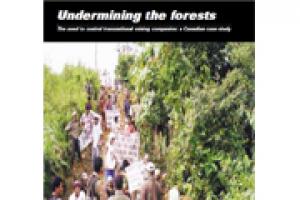The growth of the pulp and paper sector in Indonesia since the late '80s has been based on the clearcutting of vast area of forests --estimated in at least 800,000 hectares a year-- the spread of tree monocultures, the violation of indigenous peoples' land rights, and the granting of official subsidies to the companies, which often hide corrupt practices (see WRM Bulletin 41).
Indonesia
Bulletin articles
13 February 2001
Bulletin articles
13 December 2000
A recent study, sponsored by CIFOR and WWF International’s Macroeconomics Program Office, provides an in-depth analysis of the features and consequences of the rapid expansion of the pulp and paper sector in Indonesia during the last decade.
Bulletin articles
17 July 2000
Indorayon's pulp and rayon factory (PT IIU) in Porsea, North Sumatra, has provoked a long socio-environmental conflict in the region, where villagers and local NGOs have been demanding its closure -due to the pollution affecting Lake Toba because of the factory effluents, the destruction of the forests of the area and the plantation of tree monocultures to obtain raw material- while the mill's workers want to keep it open in the absence of other job opportunities in the region.
Bulletin articles
18 May 2000
A research recently performed on oil palm plantations in Indonesia studies the past and future trends of the sector, reveals its effects on the country's economy, local communities and forests and proposes recommendations to this regard.
Bulletin articles
20 February 2000
The OED Report starts by highlighting that the so called "Indonesian miracle" was the result of an export-led strategy in which forest resources were viewed "as an asset to be liquidated to support (its) growth strategy, establishing Indonesia as a world leader in the export of tropical forest products". At present the rate of deforestation reaches 1.5 million hectares per year, being commercial logging its main cause. This unsustainable use of forests has been accompanied by a highly inequitable distribution of benefits.
Other information
19 February 2000
The World Bank is apparently willing to play a major role in the promotion of tree plantations. This can mean good or bad news, depending on the type of plantations it is willing to promote. The country studies provide useful -though incomplete- information on the issue, which we believe the Bank should use as a starting point for its own research on the positive and negative impacts of different types of plantations. It appears clearly that large-scale monoculture tree plantations should not be promoted, given their negative environmental impacts and their few positive social effects.
Bulletin articles
20 January 2000
Borneo, one of the biggest islands of the Malaysian archipelago in South East Asia, is under the sovereignty of three states: Malaysia, Indonesia and Brunei. Originally this big island was completely covered by dense tropical forests. The expansion of the lumber-exporting industry, together with oil palm and pulpwood plantations both in Malaysia and Indonesia have nearly completely destroyed the Bornean forests. Consumers of tropical timbers in the North, such as buyers of plywood for home building in the USA are ultimately responsible for this ecological disaster.
Publications
16 January 2000
by Forest Peoples Programme, Philippine Indigenous Peoples Links and the World Rainforest Movement
Bulletin articles
20 December 1999
Intentional fires, tree monoculture plantations and mining are direct causes of deforestation in Indonesia. Additionally, indigenous peoples traditional rights over their territories are ignored. As a result, the country's once vast and luxurious forests are vanishing and, according to two recent independent studies, deforestation rate is faster than what the authorities are used to admitting. A World Bank research, based on map studies, and issued last July estimates an annual forest loss of 1.5 million hectares during the last two decades.
Bulletin articles
20 October 1999
More than 150 Indonesian and international NGOs -among them the WRM- have endorsed a sign-on letter addressed to the authorities of that country denouncing the situation of two national parks and proposing solutions. The initiative was launched by Telapak Indonesia and the Environmental Investigation Agency. The letter reads:
Bulletin articles
24 August 1999
Indonesia is undergoing an accelerated process of plantation of oil palm. In a process promoted by the government -that wants the country to become the first palm oil producer in the world- and led by a reduced group of powerful companies, the present area of 3.2 million hectares is expected to increase at a rate of 330,000 hectares a year.

